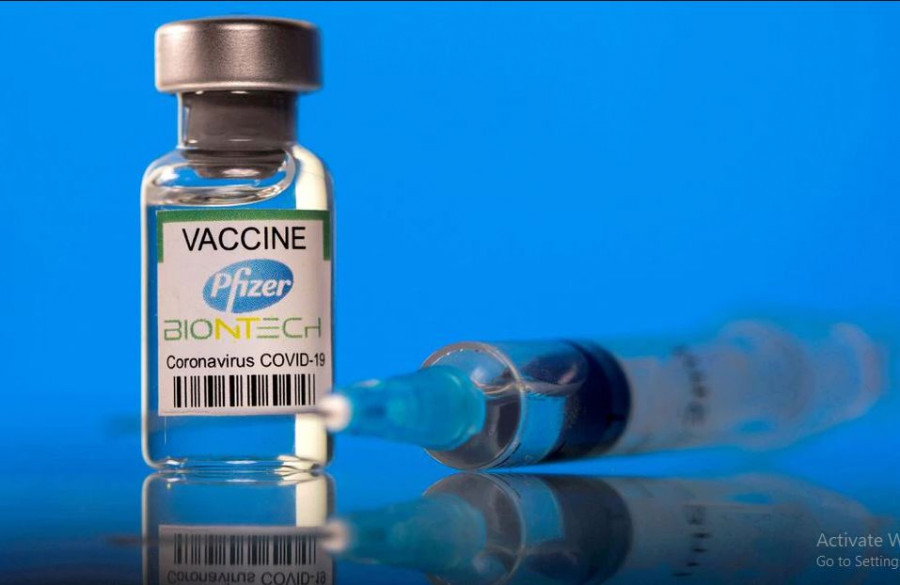Health
Pfizer doses for children arriving next week, to be rolled out on June 23
Around two million 5–11 year olds in 27 districts will be inoculated in the first phase.
Arjun Poudel
The Ministry of Health and Population has started preparations to start administering Pfizer’s Covid vaccine to children between five and 11 years from June 23 although the exact date of supply is still uncertain.
Officials at the Department of Health Services said that they expect to receive two million vaccine doses around one week before their planned rollout date, but added that supply could also be delayed to June 23. In case of a delay, the rollout will also be delayed.
“We do not yet know the exact date of supply, but it could also be delayed to June 23,” an official at the Department of Health Services said, asking not to be named.
“Preparations are underway to roll out the jabs from June 23 hoping that we receive them by June 19, the initially agreed date. But we are not completely sure if the doses will arrive on that date.”
The Health Ministry has decided to run the vaccination campaign for the children aged between five and 11 years in two phases—first in 27 districts and later in the remaining 50 districts.
Children of the said age group in Jhapa, Morang, Sunsari, Saptari, Dhanusha, Parsa, Siraha, Mahottari, Kathmandu, Lalitpur, Bhaktapur, Chitwan, Kavrepalanchok, Sindhuli, and Nawalparasi West will be inoculated in the first phase.
Other districts in which vaccination drives have been planned in the first phase are
Rupandehi, Banke, Dang, Kapilvastu, Bardia, Surkhet, Kailali, Kanchanpur and Dadeldhura, according to Health Ministry officials.
Officials concede that vaccination schedules could change if the doses do not arrive by June 19.
Sagar Dahal, chief of the National Immunisation Programme, however, said that his office is not expecting a delay in the supply and has been working to launch the drive on June 23, which will continue until June 29.
“We don’t think the doses will be delayed,” said Dahal. “We have told COVAX officials to supply the vaccine doses at least one week prior to the rollout date.”
Nepal will receive 8.4 million paediatric doses of the Pfizer-BioNTech vaccine free of cost. The United States government will bear the cost of the vaccine doses, which will be supplied by COVAX, the United Nations backed international vaccine-sharing scheme. The USAID had facilitated the process, officials said.
The Department of Health Services has already secured emergency use authorisation for the Pfizer doses from the Department of Drug Administration, and completed training of health workers of 21 districts.
Training is being imparted to health workers of six districts where the first phase of the campaign will be launched.
Officials said that there will not be storage problems for the Pfizer doses, as they will be supplied directly to provinces upon arrival.
“We will send the doses to provinces, which will supply to districts and local units,” said Dr Surendra Chaurasia, chief of the Logistic Management Section, under the Department of Health Services.
There are two types of Pfizer-BioNTech Covid vaccines for children—one is for those between five and 11 years, and another for those aged 12 and above. Nepal has already used Pfizer vaccines on those with comorbidities and on children between 12 and 17 years.
The Pfizer-BioNTech vaccine is the only jab recommended by the World Health Organisation for use in children between five and 11 years old.
The American Association of Paediatrics has recommended administering 10 microgram doses in a gap of 21 days to children between five and 11 years. The dose, 0.2ml, is one-third of what is administered to adolescents and adults.
The vaccine vial for 5–11 year olds comes with an orange cap while the other vial is purple-capped.
Each vial with 10 doses needs 1.3 millilitres (ml) of diluent under Pfizer’s preliminary plan.
The US Food and Drug Administration in October authorised emergency use of the Pfizer-BioNTech Covid vaccine in children between five and 11 years. Several countries have already started administering the vaccine to children.
Earlier, the government had decided to inoculate children between five and 11 years with the Covid-19 vaccine from April. For that the Health Ministry had also decided to purchase 8.4 million doses of the vaccine and signed an agreement for a concessional loan of $18 million with the World Bank to procure the doses.
But with the Covid-19 infection rate dropping significantly of late, the process to procure vaccine doses for the said age group has been put on the back burner.
Officials said that plan to procure the vaccine doses halted after they saw a chance of getting vaccine doses for free.
Although the Pfizer doses for adults can be kept in normal temperatures (2 to 8 degrees Celsius) for up to 31 days, paediatric doses can be stored in normal temperatures for up to 10 weeks.
Officials plan to administer the second dose of the vaccine to children from July 18 to 25.
Dahal said that once the first phase of vaccination is completed in 27 districts, preparation for the second phase of Campaign will be started, which is likely to start from the end of August.
Nepal so far has received 53,381,570 doses of Covid vaccines of various brands—AstraZeneca, Vero Cell, Moderna, Janssen, Sinovac-CoronaVac, and Pfizer-BioNTech.
As of Sunday, as many as 19,981,665 people or 68.4 percent of the total population have been fully vaccinated in the country, according to the Ministry of Health and Population.




 9.7°C Kathmandu
9.7°C Kathmandu















